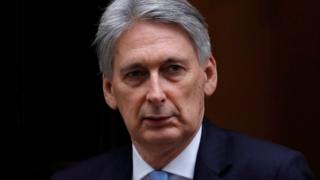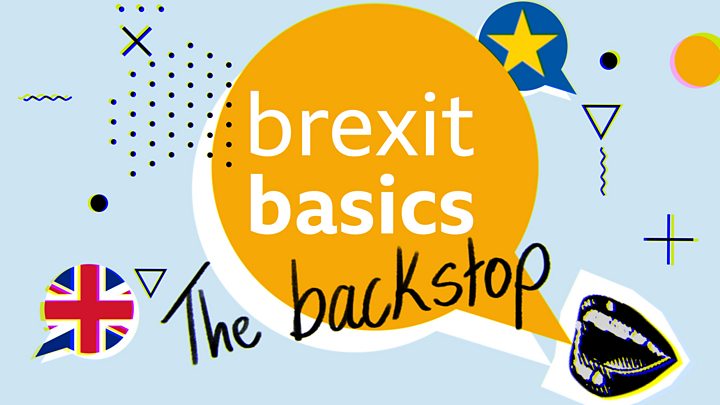Brexit: ‘Significant disruption’ from no deal, says chancellor
 Image copyright
Image copyright
Reuters
A no deal Brexit would cause “significant disruption” for the UK in the short term, Chancellor Philip Hammond has said.
He said that it would also see the economy take a “significant hit” in the medium to long-term.
Speaking to BBC Radio 4’s Today programme the chancellor refused to rule out resigning if the UK left the EU on 29 March with no deal.
He added that the impact of a no deal is “not what people voted for”.
Theresa May took the deal she negotiated with the EU to Parliament last week, but saw it voted down by an historic margin – 432 votes to 202.
MPs will vote on it again on Tuesday and are proposing a range of options, including delaying Brexit until the end of the year if Parliament can’t agree on a deal by 26 February.
The prime minister is also hoping to tweak her withdrawal agreement to persuade opponents of it that the UK will not end up tied to the EU indefinitely, so that the UK can still leave in an orderly fashion on 29 March and begin negotiating a comprehensive free trade deal.
Mr Hammond said leaving with a deal was the “only credible and sustainable way” forward, and he believed it was his job as chancellor to “drive us towards a compromise deal”.
Speaking from the World Economic Forum in Davos, Mr Hammond said: “What people were told in the referendum campaign… [was] that we would be able to get a deal with the European Union that would protect jobs and our prosperity, and that our exit could be smooth and orderly to a new relationship with the European Union.
“But it is absolutely clear that if we don’t get a deal, that is not the way it will work.
“There will be very significant disruption in the short term and a very significant hit to our economy in the medium to long term.”
The chancellor said the government needed to “respect the decision of the referendum”.
But, he said they should “do it in a way that gives [people] the future prosperity they were promised”, adding: “People did not vote to be worse off, they voted to be better off”.
Will the EU compromise to stop a no deal?
While in Davos, the chancellor is meeting a number of global business leaders, but he has also been speaking to European politicians.
He believes there may be some wriggle room on the controversial “backstop” element of Mrs May’s deal, condemned by hard line Brexiteers in her party and the DUP – whose votes she relies on in Parliament.
The backstop is the last resort clause to stop the need for a hard border between Northern Ireland and Ireland after Brexit. A hard border would lead to checks on people and goods travelling between the two countries, unlike now where both can pass freely.
Critics say it would keep Northern Ireland too closely aligned to the EU, and could see it trapped in the relationship permanently. But the EU has insisted on it as one of its red lines in the Brexit negotiations.

Media playback is unsupported on your device
Mr Hammond said he did not believe the EU would compromise on its “fundamental position” around the backstop, but some in the bloc were looking at their red lines and if they could move.
“What I am hearing from European politicians and commentators is that they do take this issue very seriously, they understand the challenge that we have got at home and generally – not all of them, but many of them – want to help,” he said.
“They are not prepared to compromise on the fundamental principles that the EU has set out, but they certainly are looking at whether there is anything they can do without compromising those principles.”
Earlier on the Today programme, French finance minister Bruno Le Maire said it was up to the British government to find a way out of the situation, not EU member states.
He told Today that the backstop issue was “done” and the EU had “nothing to give” on the Brexit deal apart from “clarifications”.
But Mr Hammond said the French had “always been the hardest in this debate” and talking to other European politicians would offer “a more balanced view”.
Would cabinet members quit over no deal?
Work and Pensions Secretary Amber Rudd, who backed Remain in the referendum, said on Thursday that she would not rule out quitting her post over a no deal Brexit.
She told BBC’s Newsnight that “it’s too early for anyone to make those sort of commitments because at the moment there is a lot of change going on”.
But she has called for a free vote on Tuesday, stopping the government whipping MPs to a particular standpoint, and added: “We’ll see what position the government takes.”
Pressed on whether he would resign if the UK left without a deal, Mr Hammond – who also backed Remain – would also not rule it out.
He told Today: “I clearly do not believe that making a choice to leave with without a deal would be a responsible thing to do.
“But I recognise that that is potentially a default that we could find ourselves in and if we did… then the responsible thing to do is to use every possible way of mitigating and minimising the impact.”
The chancellor dismissed the questions of whether Article 50 – the mechanism that sees the UK leave the EU on 29 March – should be extended, saying that “the fact the clock is ticking is probably most powerful force that will bring people together around a sensible compromise”.
He said Tuesday’s Commons vote was not “high noon” and colleagues would be allowed their say over the way forward with Brexit.




